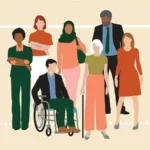Editor's Note
This blog post is a testimony of the writer on her negative experience with study advisors at the University of Groningen. While she is speaking up publicly about her experience, for privacy reasons the motive behind her appointments with the study advisors will not be disclosed.
The University of Groningen describes study advisors as such:
“The student advisors offer supra-curricular counseling. They play an important role in academic career counseling offered by our faculty to students during their time here. Naturally, all matters remain confidential. You can consult the student advisor for:
discussion of and possible help with your study method, exam preparation, planning, etc.;
choices and finding out where your ambitions, goals, and interests lie;
support in the event of personal problems or impediments;
- advice in the event of problems with a curriculum, sexual harassment, problems with a supervisor, etc."(https://www.rug.nl/feb/education/studiekeuze/study-advisors/)
“The first time I commenced my studies at the University of Groningen was in September 2018. From the very beginning, I had heard lecturers advising us to talk to student advisors if anything was hindering our academic course. Along with that, they were always mentioning the necessity to do it as early as possible. They wanted to stress that advisors would only be able to help if they were informed in advance. As someone who was joining university for the first time, I didn’t know or expect such an obvious encouragement to seek help, but it was reassuring to know it could be there when I needed it. And I needed it. I didn’t ask for it, though. For the most part, it was my conviction that I didn’t have to ask for any help. Perhaps it was also a bit of my first experience with an advisor who wanted to ask me about my BSA performance in the form of “Dutch directness” which I had never encountered before (and to this day never had again). “Dutch directness” basically meant that he sat me down and very straightforwardly asked me how many hours I was studying so that he can then proceed to tell me how many hours I should be studying. All in a very school principal-y kind of way, which I was not used to, and to me (call it culture difference if you like) seemed like I was being lectured in a bad way. A few months later, I had disenrolled and was planning my return for the following September.
September 2019. I was not willing to make the same mistake as before. Anyone who has gone through the experience of dropping out can tell you that no matter if it felt right for you, what you will be thinking about is how it’s going to look for the outsiders who hear about it. You abandoned the ultimate ship for your age. You ran from the one thing you were prepared for throughout your school life. And you may not even feel bad about your choice until you have to mention it to someone and then suddenly, you find yourself in an apologetic space in your head.
Upon my return, the first item on my to-do list for the new academic year was to book an appointment with an advisor. I went there and sat in front of a stranger, prepared to talk about personal matters I never talk about, just because I didn’t want to abandon the ship again. I didn’t know what to expect out of it exactly. I didn’t know what questions to ask to see if I was eligible for any accommodations from the University. I didn’t even know what “accommodations” really meant. I only knew that there were people who could ask for extra time during the exams, for example. I tried to find more information on the University platform but with no luck. I didn’t know what kind of assistance I was entitled to if any. I was hoping that after going there and being an emotional mess in front of a stranger (because that was what was going to happen and I knew it already), she would essentially pity me and tell me what could be done in my case. And I was partially correct. I did cry, she did pity me. Did she help me? No. After spending around half an hour crying in front of a stranger, she was very sorry she didn’t know how to help. I wasn’t feeling comfortable asking for any accommodations directly. It was a combination of “I don’t want her to think I’m pretending just to rip any benefits” (that’s some imposter syndrome for you) and I didn’t want to act as if I had the right to have it ”easier” than my peers.
And on top of that, what kind of requests could I make in my case? The extra time during an exam surely is helpful, but not necessarily what could make my university experience more tolerable. She tried to make suggestions on where I can direct myself for further assistance outside of the University and sent an email follow-up demonstrating an interest in how I proceed, but that was it.
Months passed, the pandemic hit and everything went online. At least when it comes to my study, it seemed easier to get through this new circumstance, but I knew this wouldn’t last until the end of my studies. So once again, the first thing on my to-do list for the new academic year: book an appointment with a study advisor; a new one this time. I knew I needed some assistance and I had convinced myself that maybe the previous advisor had not realized why I was telling her what I was telling her. She was quite older and she had admitted that her English was not the best. Then I booked my meeting with the second adviser, who was younger. This time the meeting was in an online setting. I still didn’t know what I could ask for or how to ask anything. I was once again hoping that she will see my distress and offer me a solution. Well… she didn’t. The same thing as the first time happened, only now it was online and this study advisor managed to make it worse. She had the bright idea of suggesting that I leave and come back next year. I tried to explain to her that I had already done this and it was not manageable to do this once every couple of years, but that was all that she could suggest. Ever since all I can think of her suggestion is what a privileged solution this is. She seems to completely ignore the huge ongoing housing crisis in the Netherlands and how so many international students either pay ridiculously overpriced accommodations or have to leave because they are literally homeless and might even sleep in the streets. There is no guarantee I will be able to return once I leave my room, simply because there is no guarantee I will have a place to stay. And let’s not forget that I am not financially independent. My food, my accommodation, and my tuition fees are all paid by my parents. I can’t come and go as I wish. No person in their early 20’s, unemployed, with no higher education certificate can. This is why I’m struggling to finish this, my dear advisor… Once again, no help and some added frustration on the advisor’s ignorance of socioeconomic realities.
That academic year thankfully passed. Not well, but it passed. My quest for the promised assistance continues. I am going with a student counselor this time. Maybe they will help, maybe they won’t. I want to have hope. Especially since April 2022, the University has started updating its platform with more information about eligibility for accommodations. They have included a bunch of information that was nowhere to be found in the previous years. Different policies of assistance on different circumstances, an actual list of all the circumstances you could ask for help for, and documents describing what you need to be eligible. At least now I know that I fulfill the criteria. Wish me luck!”
About the Author
Mikaella (she/her) comes from Cyprus and studies Psychology as a major with minor courses in English Language and Culture. She has been the Activity Coordinator of Let's Talk About Sex Groningen (LTAS) since 2021. A lot of her free time is dedicated to organizing as an activist with a focus on social justice issues, women's rights, and sex education.
Editor: Francis Urciullo



